Project Jukebox Survey
Help us redesign the Project Jukebox website by taking a very short survey!
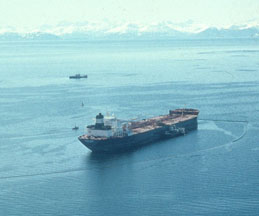 The Exxon Valdez Oil Spill occurred in Prince William Sound, Alaska on March 24, 1989 when the Exxon Valdez oil tanker struck Bligh Reef. An estimated eleven million gallons (257,000 barrels) of North Slope crude oil flowed into the Sound, creating the biggest tanker oil spill in U.S. history at that time.The oil fouled 1,300 miles of wildlife-abundant shoreline from Cordova to Kodiak Island and killed hundreds of thousands of seabirds and marine mammals. The communities of Cordova, Valdez, Chenega,
The Exxon Valdez Oil Spill occurred in Prince William Sound, Alaska on March 24, 1989 when the Exxon Valdez oil tanker struck Bligh Reef. An estimated eleven million gallons (257,000 barrels) of North Slope crude oil flowed into the Sound, creating the biggest tanker oil spill in U.S. history at that time.The oil fouled 1,300 miles of wildlife-abundant shoreline from Cordova to Kodiak Island and killed hundreds of thousands of seabirds and marine mammals. The communities of Cordova, Valdez, Chenega, 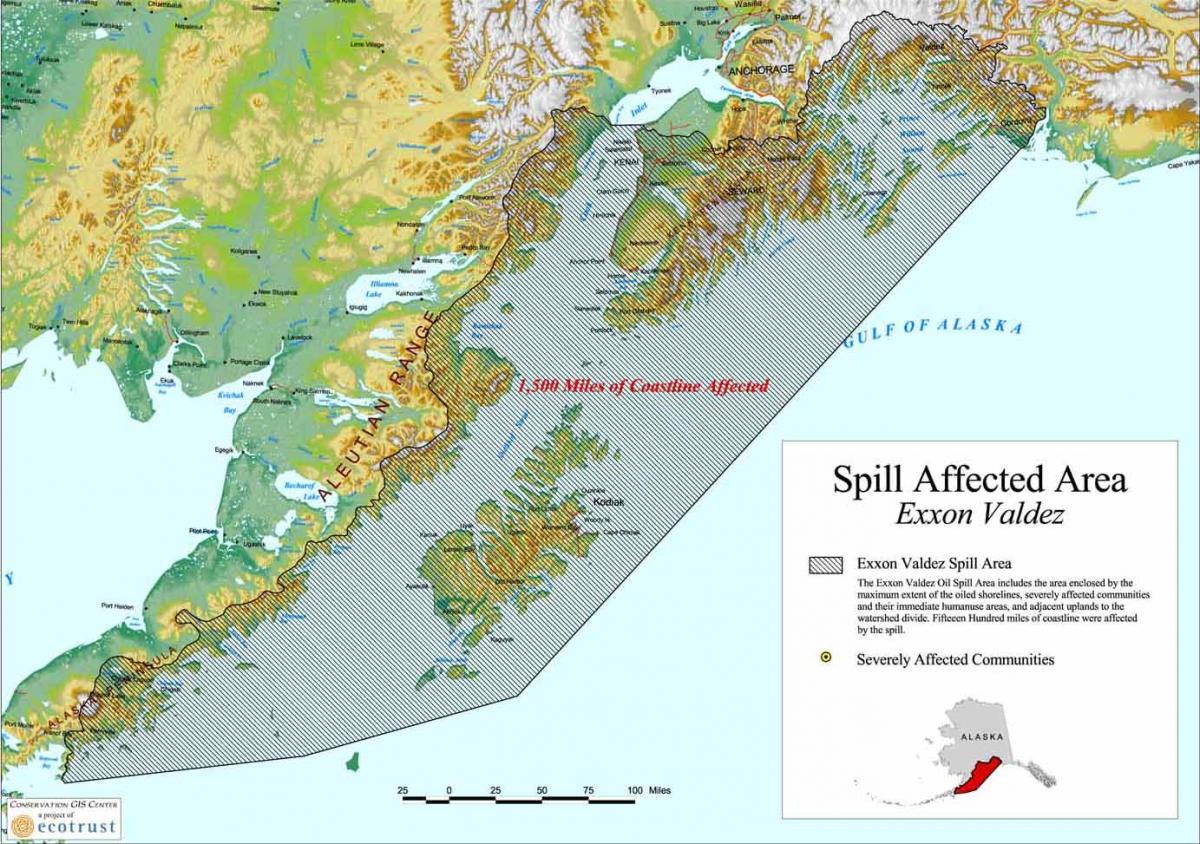 Seward, Nanwalek, Port Graham, Seldovia, Homer, and Kodiak were all greatly impacted. Oil washed up on shore as far away as the village of Chignik on the Alaska Peninsula, 470 miles from Bligh Reef. The human damage included financial and subsistence loss and increases in drug and alcohol abuse, domestic violence, mental health problems, and occupational problems.
Seward, Nanwalek, Port Graham, Seldovia, Homer, and Kodiak were all greatly impacted. Oil washed up on shore as far away as the village of Chignik on the Alaska Peninsula, 470 miles from Bligh Reef. The human damage included financial and subsistence loss and increases in drug and alcohol abuse, domestic violence, mental health problems, and occupational problems.
The oil spill not only saddened those who gained food, income and spiritual sustenance from a wild and beautiful place, but caused widespread outrage in the nation’s environmental community. This led to demonstrations, boycotts of Exxon gas stations, and protests by Exxon shareholders. There were Congressional hearings, criminal indictments, and major overhauls of oil-spill prevention and cleanup laws. It led to the formation of Prince William Sound Regional Citizens’ Advisory Council (PWSRCAC), which promotes environmentally safe operation of the Alyeska Pipeline Marine Terminal in Valdez, Alaska and the oil tankers that use it.
The Exxon Valdez Oil Spill Project Jukebox contains interviews with people directly caught up in the oil spill. People talk about how the spill impacted their lives and livelihoods, the cleanup work they did and whether the cleanup was effective, impacts to the fish and wildlife, long-term effects of the spill, and the regulatory and governmental structure of oil spill prevention and response. These stories, plus many more, appear in the book: The Spill: Personal Stories from the Exxon Valdez Disaster, by Stan Jones and Sharon Bushell. (Kenmore, WA: Epicenter Press, 2009). PWSRCAC created this project to preserve a record of the Exxon Valdez disaster to make sure nothing like this ever happens again. The Exxon Valdez Oil Spill Project Jukebox was created in 2014. The information in this project reflects the context of the original creation date. Some information may now be out of date.
People
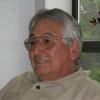 |
Gary Bader |
At the time of the 1989 Exxon Valdez Oil Spill, Gary Bader was the Human Resource Manager for Alyeska Pipeline Service Company (Alyeska). Founded in 1970, Alyeska is a consortium of oil companies responsible for the design, construction, and operation of the Trans-Alaska Pipeline System and the Valdez Marine Terminal. Gary’s responsibility within Alyeska during the oil spill was to handle safety and fire protection within the Valdez Marine Terminal. Gary later served as Alyeska’s liaison... Read More |
 |
Joe Banta |
Joe Banta has a background in fishing and fisheries and grew up in Cordova, Alaska. He has a B.S. degree in biology from the University of Alaska, Anchorage. As one of the first staff members of the Prince William Sound Regional Citizens’ Advisory Council, Joe provides a wealth of knowledge and experience to the Scientific Advisory and Oil Spill Prevention and Response committees. |
 |
Robert Benda |
For over 25 years, Robert Benda was a biology professor for the Prince William Sound Community College in Valdez, Alaska. He taught a wide range of classes including environmental studies, statistics, and biology. He has a bachelor’s degree in zoology and botany from Indiana State University, a master’s degree in zoology and botany from DePauw University, and a Ph.D. in ecology and systematics from Indiana State University. During the 1989 Exxon Valdez Oil Spill, Robert worked for the Alaska... Read More |
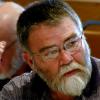 |
Tom Copeland |
Tom Copeland was born in Hilo, Hawaii and raised in Tucson, Arizona. His family immigrated to Alaska in 1962, where Tom began fishing in Cordova the following year. On March 24, 1989 Tom was on the board of Cordova District Fishermen United. Two weeks after the oil spill, Tom resigned from the Board to do what he describes as “bucketeering” or removing oil from water by hand with buckets. Tom’s cleanup efforts were conducted independently from the organized industry and government cleanup... Read More |
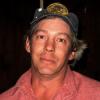 |
John Devens, Jr. | John Devens, Jr. is a long-time Alaska resident who assisted with the cleanup of the 1989 Exxon Valdez Oil Spill. He currently lives in Copper Center, Alaska. |
 |
John Devens, Sr. |
John S. Devens, Sr. was the mayor of the City of Valdez, Alaska at the time of the 1989 Exxon Valdez Oil Spill and represented the city throughout the cleanup. During the cleanup, he helped form the Oiled Mayors Group, a coalition of leaders from oil communities responsible for managing community relations with Exxon Corporation and VECO. He also helped form the Prince William Sound Regional Citizens’ Advisory Council (PWSRCAC) and served... Read More |
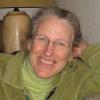 |
Jane Eisemann |
Jane Eisemann has been a resident of Kodiak, Alaska for more than 35 years, working as a commercial fisherman for 23 of those years. Jane put herself through college by fishing salmon and herring, and earned a bachelor’s degree in education and a master’s degree in maritime education and training. She currently teaches maritime science and technology as well as natural resources at Kodiak High School. In 2001, Jane Eisemann joined the Prince... Read More |
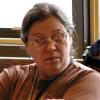 |
Patience Faulkner |
Patience Anderson Faulkner is an Alaska Native, born in Cordova, Alaska. She worked as a legal technician with the litigation team for the 1989 Exxon Valdez Oil Spill lawsuit. She has served on several Cordova community boards and commissions, including since 1998 on the Prince William Sound Regional Citizens’ Advisory Council (PWSRCAC) representing Cordova District Fishermen United (CDFU). One of Patience’s most influential impacts within... Read More |
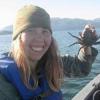 |
Katie Gavenus |
Katie Gavenus grew up in Homer Alaska, and was two years old at the time of the 1989 Exxon Valdez Oil Spill. Katie, her family, and her community were deeply impacted by the oil spill. Feeling that the impacts of such an event on children were not recognized enough, Katie established Children of the Spill, a digital oral history project featuring young people affected by the Exxon Valdez and 2010 Deepwater Horizon oil spills. |
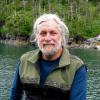 |
David Janka |
David Janka has been a year-round resident of Prince William Sound since 1977. In 1989 at the time of the Exxon Valdez Oil Spill, David and his family were care-taking a remote lodge on Glacier Island, 10 miles west of Bligh Reef in Prince William Sound. Since then he has been involved in oil spill cleanup, research, public education, and environmental advocacy. He served as Executive Director of the Prince William Sound Conservation Alliance, as well as a coordinator and participant of the... Read More |
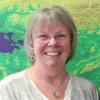 |
Marilyn Leland |
At the time of the 1989 Exxon Valdez Oil Spill, Marilyn Leland was the Executive Director of Cordova District Fishermen United in Cordova, Alaska, and helped lead the fishermen’s response to the oil spill throughout Prince William Sound. Leland was one of the founders of the Prince William Sound Regional Citizens' Advisory Council (PWSRCAC). PWSRCAC is an independent non-profit citizens oversight group promoting the environmentally safe... Read More |
 |
Bob Linville |
Bob Linville is an Alaskan fisherman currently residing in the town of Seward, Alaska. As a commercial fisherman in Prince William Sound, Bob was greatly affected by the 1989 Exxon Valdez Oil Spill. His fishing business suffered, he ended up working on the cleanup and bird rescue operation, and he associates subsequent health problems to the oil spill. |
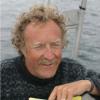 |
Craig Matkin |
Craig Matkin has conducted research on marine mammals in southern Alaska since 1977, and received his M.S. degree in Zoology from the University of Alaska Fairbanks in 1980. Since 1982, he has worked as executive director of the North Gulf Oceanic Society based out of Homer, Alaska. He has studied marine mammals across southeast Alaska, through the Aleutian Islands, and the Bering Sea. He loves both the beauty and vitality of Alaskan waters,... Read More |
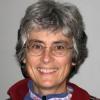 |
Riki Ott |
Riki Ott, PhD, is a marine toxicologist, author, and former commercial fisher. She was born and raised in Wisconsin. When she was a young teen, her father sued the state of Wisconsin to ban DDT, instilling a strong environmental health ethic and awareness in her. Upon reading Rachel Carson's Silent Spring and The Sea Around Us, Riki decided to become a marine biologist; a decision that brought her to Cordova, Alaska in 1985 after earning advanced degrees in marine toxicology.... Read More |
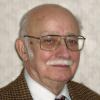 |
Walt Parker |
Walter (Walt) Parker was born in 1926 in Spokane, Washington. As a child, he heard about Alaska from his grandfather, who told him about his life in Nome during the Gold Rush. After serving in the U.S. Navy during World War II, Walt arrived in Fairbanks in 1946 with his bride Patricia Ertman. He studied at the University of Washington, Syracuse University, and George Washington University, and received degrees from the University of Alaska in history and anthropology in 1964 and an honorary... Read More |
 |
Roy Robertson |
During the 1989 Exxon Valdez Oil Spill, Roy Robertson supervised the community of Seldovia’s response and cleanup efforts. He later helped found the Seldovia Oil Spill Team, a community-based response organization. Robertson has since gained considerable experience with oil spill response and monitoring in Washington and Alaska. He has served as a consultant to both the Cook Inlet and Prince William Sound Regional Citizens’ Advisory Councils, as well as the Alaska Department of Environmental... Read More |
 |
Gordon Scott |
Gordon Scott came to Alaska in 1974, and began fishing out of Whittier, Alaska while living in Girdwood with his wife, Elly, and their three sons. During the 1989 Exxon Valdez Oil Spill, he spent 186 days working on the cleanup. Since the oil spill, Gordon has been involved with various oil spill prevention and response activities, including volunteering for the Prince William Sound Regional Citizens’ Advisory Council’s Oil Spill... Read More |
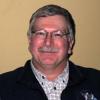 |
Jerome Selby |
Beginning in 1983, Jerome Selby served as mayor of the Kodiak Island Borough, a position he held for over 25 years. Selby’s influence during the cleanup of the 1989 Exxon Valdez Oil Spill include his involvement with the Oiled Mayors Group, a coalition of leaders from the communities affected by the oil spill. He also helped form the Prince William Sound Regional Citizens’ Advisory Council and served on its board of directors from... Read More |
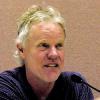 |
Rick Steiner |
From 1980-2010, Rick Steiner was a marine conservation professor with the University of Alaska. From 1983-1997, he was stationed in Cordova, Alaska as the University of Alaska’s marine adviser for Prince William Sound. While in Cordova, Rick provided leadership in the aftermath of the 1989 Exxon Valdez Oil Spill, including, but not limited to, establishment of the Prince William Sound Regional Citizens' Advisory Council, the Prince William... Read More |
 |
Scott Sterling |
Scott Sterling came to Alaska in 1976 as a surveyor with the U.S. Forest Service. He graduated from the University of Alaska Fairbanks in 1984, and then from the University of Arizona College of Law in 1986. He was the City of Cordova's attorney during the 1989 Exxon Valdez Oil Spill, and later worked as an attorney for the State of Alaska. He represented Cordova as a litigant in the lengthy settlement trial after the spill. From 1990-1993, Scott served as a board member on the... Read More |
 |
Jonathan Wills |
Jonathan Wills is a journalist from the Shetland Islands, Scotland who came to Cordova, Alaska in 1989 to report on the Exxon Valdez Oil Spill. He became an oil spill activist who has fought for improved systems of oversight and safety in oil tankers and transportion both in the Shetland Islands and Prince William Sound. Dr. Wills holds M.A. Honours and Ph.D. degrees in Geography from the University of Edinburgh. He is the author of ... Read More |



